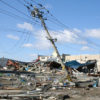Many academic institutions responded to the Covid-19 pandemic with some combination of international travel bans, domestic travel restrictions, and halts to research with human subjects. In response, social scientists have been busy sharing interim strategies for remote research, from interviews via Zoom to gathering diary entries kept by participants. In this essay, we look past these stopgap measures to argue that restarting in-person social scientific research in the next months and years will be an enormous logistical and ethical challenge.
The challenge might seem simple enough—to continue to defer research that is not yet ethically and logistically feasible, while allowing research to proceed if and when it is. But, we argue, discerning the difference between these possibilities will not be straightforward. It will require informed scholarly expertise from across the social sciences and humanities, rather than the broad-brush administrative policies instituted in response to the pandemic’s first phase.
Although field research includes a wide range of methods, including archaeological excavations, gathering of biological or health data, field experiments, surveys, semi-structured interviews, and immersive ethnography, we focus on the latter two. Nonetheless, many issues we discuss are relevant for other methods, particularly those that involve interactions with human subjects.
Ethnographic research involves varying degrees of immersion in the social world of participants, but always depends on the researcher building strong working relationships through sustained in-person interaction. Carrying out semi-structured interviews depends, to varying degrees, on the building of relationships, ranging from one-off interactions with elites whose work it is to interact with researchers to connections that are not even possible until the researcher forges long-standing relationships based on familiarity and trust.
Challenges
The Covid-19 pandemic, and the public health responses to it, present at least four challenges to semi-structured interviews and ethnography.
“There remains profound uncertainty about both the epidemiology of the pandemic and its social, economic, and political consequences.”First, there remains profound uncertainty about both the epidemiology of the pandemic and its social, economic, and political consequences. Some uncertainties stem from the challenging and not-yet-understood nature of the virus—whether and to what extent the infection confers immunity, whether a second wave emerges some months from now, etc. Others stem from the unpredictable actions of authorities of all types at all levels—e.g., in how they manage exposure to the virus over time, including the use of the threat of the pandemic to increase intimidation and repression of citizens, residents, and perhaps, researchers. Still others will persist from the slow and halting ways in which people will regain confidence in resuming activities they took for granted before the pandemic, which will depend on rates of mortality and illness among certain groups as well as long-term social and economic consequences for some families.
Second, many field research projects include participants whose lives are, and may be for some time to come, in turmoil, particularly the rural and urban poor, workers in the informal economy, and migrant and undocumented communities around the world. Both the turmoil and the increased vulnerability of many of these populations in the context of the pandemic mean that research may need significant adjustments along multiple axes—methodological, theoretical, logistical, and ethical—in order to resume.
Third, because much field research depends on—and is often precisely concerned with analyzing—social interactions, any research method that involves close proximity to human subjects will be difficult to impossible under active social distancing. Even after these rules and practices are relaxed, interactions may be constrained for some time to come.
Fourth, how should researchers ensure that they themselves are not a vector for the virus? And, how should compliance with public health regulations as well as local social distancing norms, which are likely to vary enormously across settings, factor into research design, redesign, initiation, or execution? What if local rules and norms provide too little protection for subjects or for researchers?
These challenges have a tangible impact on the questions of when fieldwork can safely and ethically resume and what research can be done in the meantime.
Implications
“Research in labs and libraries, and even in international archives or museums, will be possible long before many kinds of field research.”Timeline. For all these above reasons, we expect that ethnographic and other in-person field research will likely be among the last areas of academic research to resume something like its prepandemic rhythms. Research in labs and libraries, and even in international archives or museums, will be possible long before many kinds of field research. Moreover, resumption will become ethically and logistically feasible at vastly different times in different localities, making for a very uneven process across field sites around the world. Based on conversations with colleagues and graduate students, we believe that much, if not most, field research outside the United States (and in many regions within) is unlikely to resume safely in 2020, and may not be logistically and ethically feasible in many settings until at least summer 2021.
Conditions. Some conditions for the resumption of US-based or international field research based at US universities include: the resumption of international air travel, State Department approval for travel by US citizens, the lifting of internal travel restrictions and of severe social distancing decrees by the local government in the relevant field site, a well-documented low level of local transmission of the novel coronavirus, and, in many cases, the quarantining of the researcher before beginning research.
Other conditions are more subtle. What of non-US-citizen researchers who are already located in their research sites? What of contexts in which formal travel policy permits research, but intended participants have yet to re-knit their daily lives sufficiently to welcome engagement with the researcher? What if participants now fear or object to engagement with outsiders, especially those coming from a country with high Covid-19 infection rate like the United States, and especially given the centuries-old relationship between infection and imperialism? What if authorities are using the pandemic to suppress dissent and thereby increasing participant risk of engaging with outsiders?
Remote field research. Despite the above impediments, some research—particularly that already underway or focused on elite populations—may be possible and perhaps even productive remotely, if data security concerns are met. However, beginning a new project faces particular challenges in pandemic conditions and by remote means (unless the researcher has already built strong working relationships in the field site during previous projects). Even where research had already begun, many projects are unlikely to be possible remotely, for example those that rely on participant observation of large-scale gatherings or off-the-record discussions with elite subjects. Whatever the possibilities offered by remote research, the resumption of in-person field research is important for social science in the medium- and long-term.
Decisions
Who decides whether, when, and how field research in a particular setting and with a specific method can be ethically and logistically initiated or resumed? To our knowledge, little guidance on these concerns has been issued by relevant professional organizations or regulatory institutions.
“Timelines and plans for ethical and logistical resumption or initiation of field research will have to be very fine-grained, informed by local conditions, and sensitive to ongoing changes.”The above implications suggest that research in many field sites will face complex ethical and logistical challenges. Academic institutions should, therefore, avoid blanket policies that, in overlooking such inevitable variation, would either allow research to resume before it can be done ethically or would presumptively prohibit wide swaths of research, even that which is ethically and logistically possible. Rather, timelines and plans for ethical and logistical resumption or initiation of field research will have to be very fine-grained, informed by local conditions, and sensitive to ongoing changes.
Given the extreme variability in local conditions, we do not suggest rules or even guidelines but a few principles and a light review process that will, by necessity, vary from institution to institution. We make three assumptions: (1) the broad administrative halts to travel and research instituted in response to the initial stages of the pandemic are not good models for the resumption of research, (2) full institutional review board (IRB) re-review of all human subjects proposals before restart is not necessary, and (3) many of the ethical and logistical issues posed by pandemic-era research are not covered by existing IRB expertise and practice.
Principles
- In general, field research with human subjects is likely not possible under many practices of social distancing.
- Researchers should themselves comply with local social distancing measures, whether decrees or informal norms, and should take further measures implied by international standards. Methods should be carefully calibrated to fit local public health norms, and researchers should be aware of and responsive to changing policies and practices.
- Institutions should defer to researchers in consultation with other scholars whose regional and/or disciplinary expertise can inform decisions about resuming or initiating field research. Such consultation is important, as individual scholars are likely to face incentives to resume or begin research sooner than may be ethically advisable.
Process
“When it comes to resuming field research in the social sciences, this decision-making process must extend to include relevant disciplinary and regional experts.”Academic institutions’ decision-making over whether and when research should resume should be informed by up-to-date scientific and public health understandings of the pandemic, including its uncertainties. When it comes to resuming field research in the social sciences, this decision-making process must extend to include relevant disciplinary and regional experts. Such consultation might take the form of a light and flexible process in which networks of faculty members from relevant social science disciplines, including anthropology, sociology, political science, linguistics, economics, and public health, consider brief proposals to resume field research projects on a case-by-case basis. Humanities expertise may also be relevant, as may local academics at the site of research, NGOs, and government agencies. The purpose of these expert networks would be to ensure that the necessary process of deliberation over field conditions takes place, not to decide whether or not research is possible.
It would be highly desirable for this process to have some overlap with the relevant IRB to facilitate coordination. In the case of new projects, network members’ expertise could conceivably assist the IRB by discussing research conditions with individuals submitting new protocols to ensure that they sufficiently consider the implications of the pandemic. But the process we envision would also cover field research outside IRB purview, for example, projects exempted from review or not counted as human subjects research. If a researcher’s institution does not develop such a process, they should nonetheless engage in comparable consultations with a similar range of experts.
Conclusion
Ethnographic and other in-person field research is likely to be among the last areas of scholarship that is able to return to some semblance of normalcy, and this process will unfold very unevenly, as local health, political, and social conditions will vary, as will host country restrictions. A researcher’s decision on when to resume or begin field research should be guided by relevant expertise provided by informed faculty experts and, as appropriate, the IRB. A deliberative process will help to defer research that is not yet ethically or logistically feasible and to allow—or even improve—research that is able to proceed. The process should be nimble, consultative, and researcher-friendly, while never wavering from social science’s ethical obligations to those who participate in our research.
The authors thank Professors Stephen Latham and Claire Bowern (Yale University) for comments on an earlier draft.
Banner photo credit: SDG Action Campaign/Flickr













